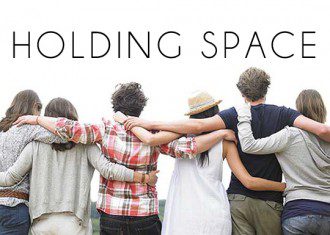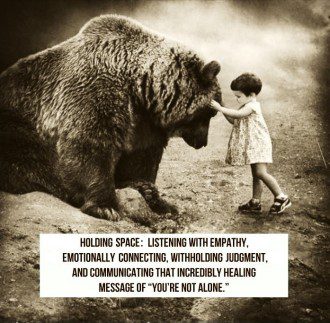4th May 2016
By Humberto Braga
Guest writer for Wake Up World
The world can be a demanding and difficult place, and we all need someone to help us through our dark times by holding space for us to process our emotions. You don’t need to be a therapist or a genius to hold space. Holding space is something we can all do for each other, whether it’s with our partners, our children, our friends, our pets, our neighbors, and even strangers in passing.
We all need it, yet relatively few of us actually know how to do it well, so let’s explore the art of holding space…
The Art of Holding Space For Others – How We Can Help When Needed
When it comes to truly supporting people in their own growth and emotional processing, we know it’s harmful to take their personal power away. Yet regardless, we still tend to unconsciously do this is several ways: by trying to fix their problems for them, shaming them by implying that they should know more than they do, or overwhelming them by giving them more information than they’re ready for. While we may think it comes from a well-meaning place of wanting to help others, true personal growth happens best when people are given free space to process their emotions, feel supported, and are empowered to make their own choices. Feedback is fine in the form of giving gentle guidance when it’s needed and sincerely asked for, as long as it’s done lovingly so they feel safe even when they make mistakes.
It’s important to feel emotionally supported even if we are unsure and make mistakes because otherwise we feel “not good enough”, unworthy, unwanted, unloved, and even abandoned. The consequences of this can have severe repercussions. It can trigger a deeply-rooted survival response driven by fear of abandonment causing us to depend on lying, manipulation, and deception in order to maintain the approval of those we look to for emotional support. It’s the same reason why children lie to their parents so they aren’t yelled at and punished.
Socially speaking, because most people aren’t made to feel emotionally safe in their community, family, or in valuing and trusting themselves, they are conditioned to trust and rely on “authority” instead, often in the form of government. We can see the consequences of this deficiency of love around the world- authoritarianism, war, anger, hate, divisiveness, greed, exploitation, disconnection from nature, etc. The list goes on and illustrates the importance of holding space. Simply put, holding space is necessary to overcome all these unhealthy, destructive behaviors, personally and globally.
When it’s time to hold space (as opposed to strictly venting or problem solving), and both people have agreed to it, it’s important to be mindful about HOW we hold space. Here are the lessons I’ve learned about holding space:
1) Drop your ego, buddy
This is a biggie. All of us fall in to this trap. We all have a natural tendency to want to “fix” people by pointing out their blindspots, telling them how to fix a problem, or judging their circumstances with the standards we hold for ourselves. Remember that what’s important is supporting the other person and just being there for them, not taking on their problems or trying to “fix” them. The more space your ego takes up, the less room it leaves for them, and the whole point is to create and hold as much space for the other person as possible.Also, don’t take their emotional outpouring personally. When we get caught up in someone else’s drama (which is a result of not giving YOURSELF enough space),we can feel like whatever emotions they happen to be expressing are about us and our ability to hold space, instead of them just venting in their process. We can feel like their success is dependent on us and their failure to quickly move through their difficulties will be our fault. It’s not about you. Getting your ego out of the way will open the door for sincere vulnerability, authentic communication, and a feeling of safety for emotional processing.
2) Create a space that feels safe enough to make mistakes
Nobody’s “perfect”. Mistakes will be made along the way while processing through sadness, fear, grief, etc. Even after processing, integrating these changed parts in to our daily lives isn’t always a clean and easy process. By dropping judgement and shame, we offer them the space to find courage, take risks, and find their inner resilience even in the face of adversity.
“Failure” is simply “things not going according to plan”, which is a part of the journey guided by greater forces than we can comprehend. Often times it’s beyond our control, but it’s not the end of the world. By allowing them the sacred space to “live and learn”, they’ll spend less time beating themselves up and more time lovingly learning from their mistakes, which is what it’s all about.
3) Don’t take the person’s power away
Taking the decision-making out of a person’s hands does little, if anything, to help them grow. With rare exceptions, like interventions for addiction and abuse, it’s best to nurture people’s autonomy by encouraging them to make their own choices (even children). Don’t forcefully direct or try to control the other person.
4) Give people permission to trust their inner wisdom and intuition
Have you ever looked back in retrospect and thought, “I had a feeling about it, but I just didn’t listen to it”? We all have an internal guidance system, but we ignore it when we get “stuck in our heads” and feel pressured. We’re often best able to tune in to this natural navigation when we’re relaxed, embodied, and feel supported. Our inner garden grows much better with trust and support, rather than doubt and criticism.
5) Give people only as much feedback as they can handle
Whether information or emotional intensity, be mindful not to overwhelm others with more than they can process in their tender, vulnerable time. Too much emotional intensity can be distracting and take people out of their internal presence, or make people feel unsafe, even if the words are kind. Too much information can disconnect us from being with our emotions and processing. Even worse, it can make us feel incompetent, inferior, and unworthy.
6) Provide support with discernment, mindfulness, and humility
People in distress can get desperate. They may think it’s better for you to provide them with answers, when it’s actually better that they learn to look within themselves. Using your own discernment will allow you to give only as much is as needed when it is truly and sincerely asked for and necessary. The balance between giving and withholding is a part of the dance when holding space and can be as subtle as prefacing suggestions with “In my opinion…” instead of “You should…” when giving guidance. Offering the right kind of support and feedback takes humility and practice, but it makes all the difference in the world.
7) Provide a container for intense, complex emotions
Victims of abuse (which we all are to varying degrees) have intense, often conflicting emotions. This can be extremely challenging if we haven’t done the necessary self-work of digging in to our psyche’s shadow and become familiar with the darkest, most intimate parts of the healing process. Deeply suppressed and confusing emotions may arise when people are suddenly held in ways they aren’t used to. It’s important that we not meet it with shame and judgement, but strength and compassion. By meeting them with tenderness and confidence, you provide them with trust and assuredness in their own process, as well as yourself.
8) Support different decisions and experiences than what you would prefer
When it comes to holding space, honoring our differences of ideology, culture, expression, and experience is necessary. We have to release control and judgement of what we think “should happen” or “is best”. Looking back on life, we can see how some of our choices, while perhaps “stupid”, “weird”, or “irresponsible” in retrospect, have led to consequences which place us exactly where they need to be. Sometimes the only way out is through, and in order for them to truly understand the lesson they need to have experiences unique to their own path in order to step in to the fullness of their being and true purpose.
In conclusion:
Holding space is not an art that we can suddenly master by just reading, nor can it be completely summarized by any list. It’s a uniquely idiosyncratic experience depending on the people, place, and circumstance, with endless subtleties, techniques, and levels which evolve the more we practice it. And the more we practice it with others, the more we can give it to ourselves, heal, and grow even faster, together.
Related reading:
Further reading by Humberto Braga:
- Think Humanity is F*cked?!? – 5 Facts to Make You an Optimist!
- Psychological Education and Healing – A Necessity for Humanity
About the author:

Humberto Braga is a professional visual artist, life coach, and author whose life is dedicated to facilitating an accelerated evolution of consciousness through providing practical knowledge, personal healing, social awareness, and holistic spiritual guidance towards truth, justice, freedom, and wholeness.
His work ties together several subjects and provides effective strategies to help actualize the best version of yourself and navigate the challenges of life, ranging from health, psychology, personal relationships, activism, society, government, voluntarism/ anarchism, environmentalism, paradigm shifts, metaphysics, and the hyperdimensional Matrix Control System.
Raised in Wisconsin through a very difficult childhood, Humberto grew up seeing UFOs, extraterrestrials, ghosts, and other paranormal phenomenon which compelled him to seek answers to the deeper mysteries of life. Through willpower, research, and divine guidance, he’s transformed his life far beyond his greatest childhood dreams, and presently resides in Topanga Canyon, California, living an amazingly blessed and fulfilling life.
You can connect with Humberto via:
- Email: [email protected]
- Facebook: www.facebook.com/Humberto.LVX
- Facebook (Artwork Page): www.facebook.com/HumbertoBragaArtwork
- Visual Art Portfolio: www.humbertobraga.com
- YouTube: www.youtube.com/TimeOfTransition
- Blog: https://humbertolvx.wordpress.com

If you've ever found value in our articles, we'd greatly appreciate your support by purchasing Mindful Meditation Techniques for Kids - A Practical Guide for Adults to Empower Kids with the Gift of Inner Peace and Resilience for Life.
In the spirit of mindfulness, we encourage you to choose the paperback version. Delve into its pages away from screen glare and notifications, allowing yourself to fully immerse in the transformative practices within. The physical book enriches the learning process and serves as a tangible commitment to mindfulness, easily shared among family and friends.
Over the past few years, Wake Up World has faced significant online censorship, impacting our financial ability to stay online. Instead of soliciting donations, we're exploring win-win solutions with our readers to remain financially viable. Moving into book publishing, we hope to secure ongoing funds to continue our mission. With over 8,500 articles published in the past 13 years, we are committed to keeping our content free and accessible to everyone, without resorting to a paywall.








